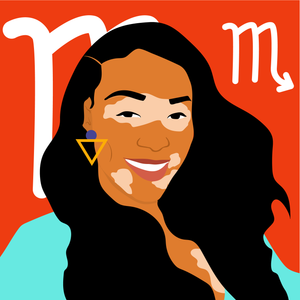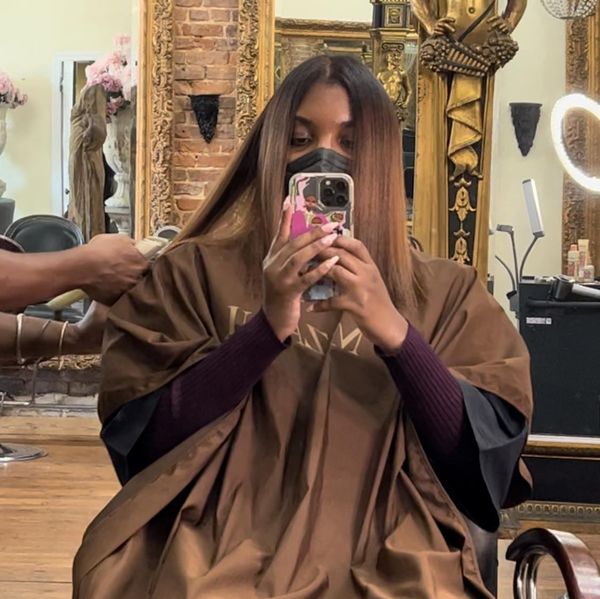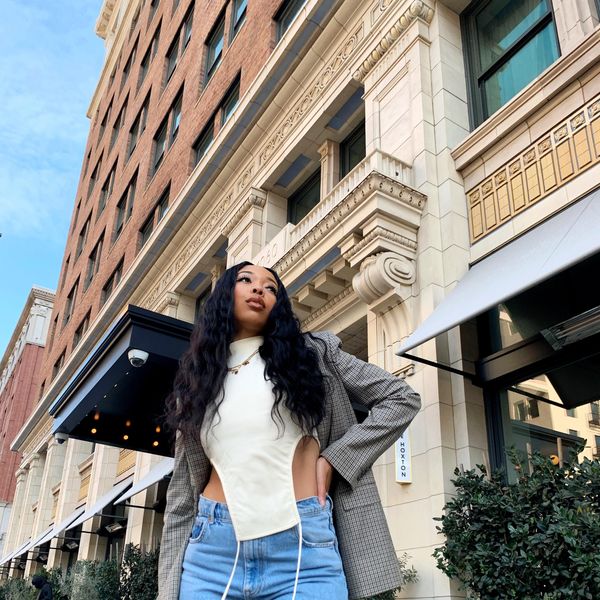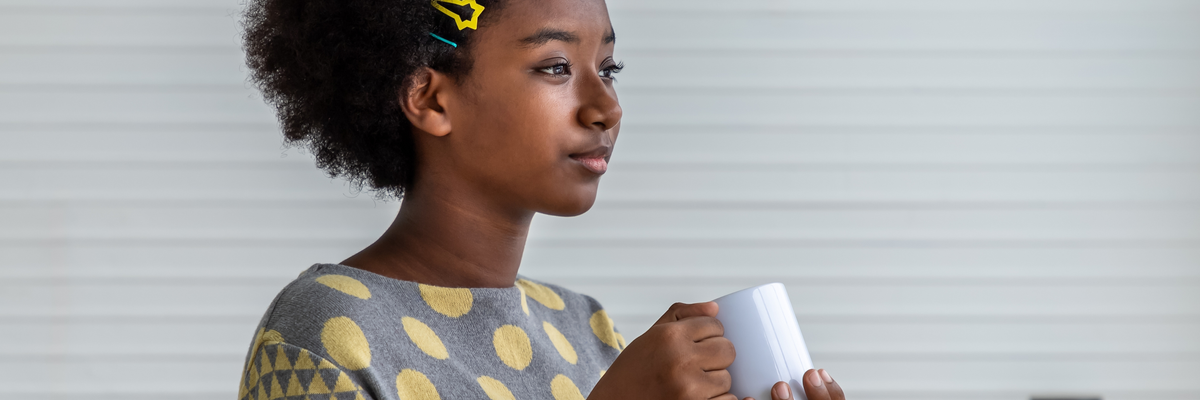Batana Oil Is What Your Skin & Hair Have Been Needing Since...Yesterday

If you’re someone who spends even a lil’ bit of time on TikTok (and you’ve got beauty content that shows up in your algorithm), you’ve probably seen at least one video this year that talks about how wonderful batana oil is — and it is.
One of the reasons why I’m so sold on it is — how many times do I have to say that long hair isn’t based on ethnicity? Speed of growth (meaning, whether your hair grows “1/2 or ¼” a month) tends to deal with genetics and the fact that some people’s hair produces more sebum that coats from scalp to tip more than others, that can result in less breakage which can lead to more length retention.
That said, still, whether you’ve got B-type hair or some level of 4, if long locks are what you are after, with some consistent nurturing and patience, you can have exactly what you desire — and batana oil just might be able to help you out…on a few levels.
Since banana oil is also an all-natural oil that can make your skin glow naturally, I wanted to take a moment or two to share with you why the next time you see a post about batana oil, you shouldn’t ignore it; invest in a bottle or jar and see why so many of us adore it just that much.
Batana Oil: What Is It?
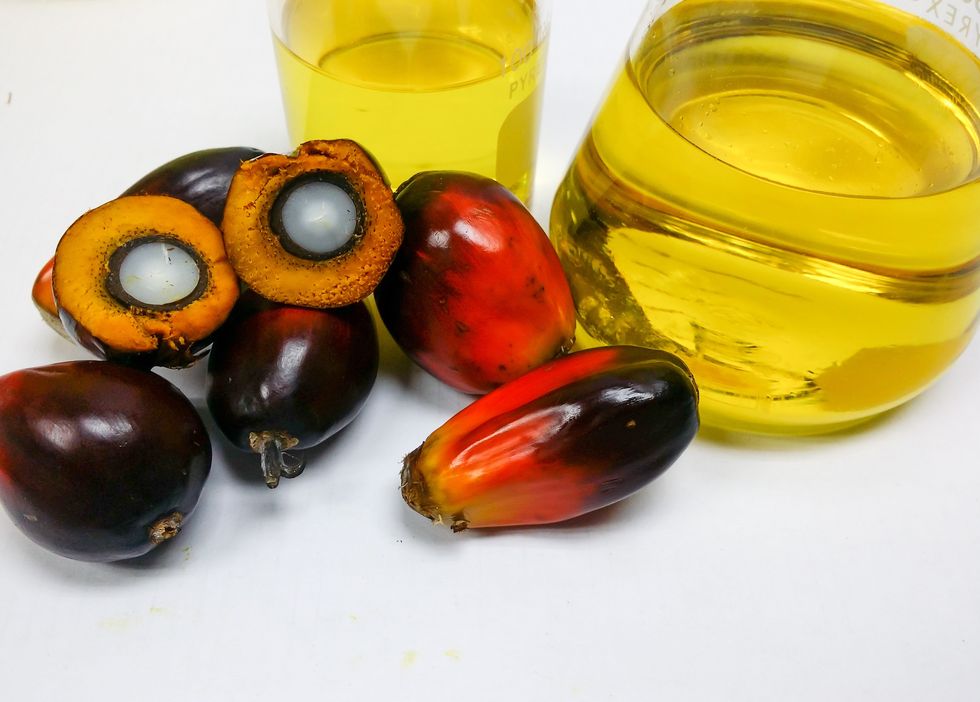
Getty Images
If you were to ask a group of Batana oil users what the oil smells like, most of them would probably say something like smoky coffee. Well, interestingly enough, the oil originates from nuts that come from a certain type of palm tree in Honduras. Although it’s thicker than, say, coconut oil, something that it has in common with it is the fact that it will solidify in cooler temperatures and melt into oil in warmer ones.
Anyway, a part of the reason why batana oil is becoming such a fan favorite within the Black community is because it is thicker and “richer” in its texture, that makes it a wonderful complement for hair textures that are curler or coarser. And since it’s also full of antioxidants, fatty acids, and vitamins A and E, it is something that can both restore and maintain the health of your skin as well as your hair.
And just how is it able to do this?
Batana Oil Benefits for Hair, Skin & More
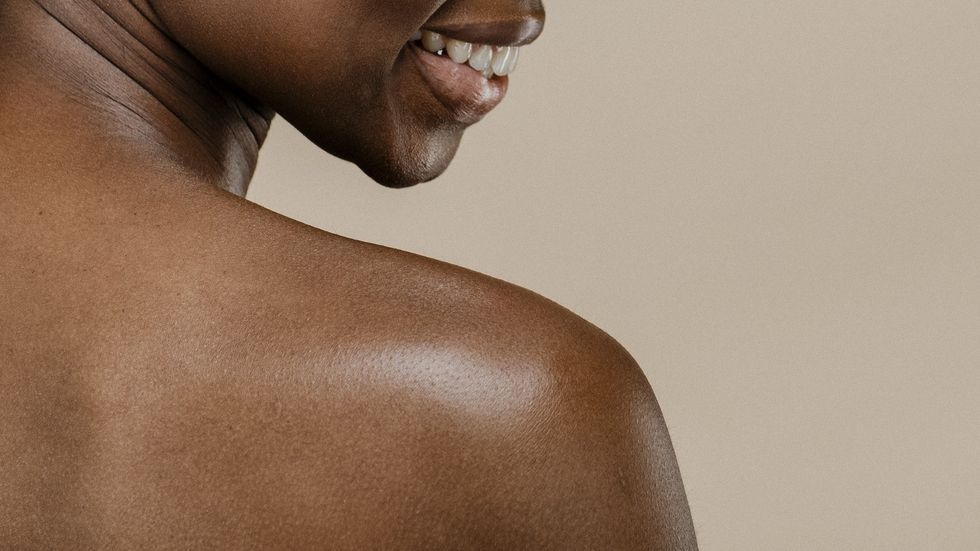
Getty Images
Batana Oil Benefits: Deeply Moisturizes Your Skin
One thing that batana oil is able to do is work as an emollient on your skin. What this basically means is it’s the kind of moisturizer that can help to hydrate and even soothe your skin. Another cool thing about emollients is they are automatically able to “seal your skin” with a protective layer of hydration.
So, if like me, you’re someone who likes to apply an oil to your skin after getting out of the bath or shower in order to maintain moisture for a longer period of time, batana oil is one of the best types of oil to apply.
Batana Oil Benefits: Fights Off Free Radicals
If, whenever you read a skincare article, it says something about free radicals and you’re wondering why you should even care about those, probably the quickest explanation that I can give you is they can cause oxidative stress, which can ultimately accelerate the aging process of your skin. So yes, you want to do all that you can to keep them “off of you.” Something that is able to do that? Yep, batana oil.
Because it contains the kind of antioxidants that help to keep UV damage from impacting your skin on a significant level, that is another reason to consider adding it to your skincare beauty regimen. Just make sure that you don’t substitute it for sunscreen. You will definitely need that as well.
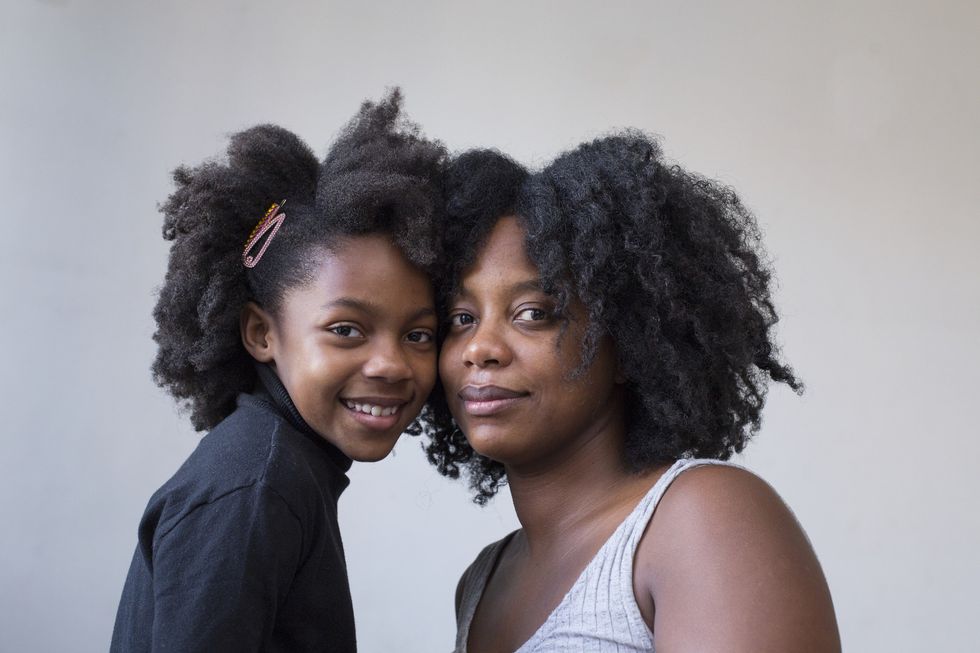
Getty Images
Batana Oil Benefits: Great for Scalp Health
Okay, so one of the things that turned me into a superfan of batana oil is how well it moisturizes my scalp. Dry scalp is something that I deal with pretty often, and since that not only can lead to itchiness and irritation, it can also have my hair looking dry and brittle, I want it to be lubricated on a consistent basis. Batana oil is able to do that, in part, thanks to the carotenoids that are in it.
Carotenoids are pigments that convert to vitamin A. This is great, as far as your scalp is concerned, because it helps your scalp to naturally produce sebum, protects your hair follicles, and ultimately encourages hair growth.
Indeed, a healthy scalp is the foundation for healthy hair (check out “Your Scalp Ages Six Times Faster Than Your Face. Why It Matters.,” “10 Things Your Scalp Has BEEN Waiting For You To Do” and “Treat Your Scalp To A Little Bit Of Detoxing This Weekend”).
Batana Oil Benefits: Helps to Prevent Hair Breakage and Reduces Frizz
As I already mentioned, something else that batana oil has in it is vitamin E. That makes it good for your skin because it contains anti-inflammatory properties along with compounds that help to protect and even repair your skin’s cells. As far as your hair goes, vitamin E increases blood circulation to your scalp so that your hair follicles are able to get even more of the nutrients that it needs (in order to improve the quality of your hair strands); plus, vitamin E add shine to your hair.
Also, since vitamin E can literally help to rebuild the structure of your hair too, that’s why many users say that batana oil has caused them to gain more inches as far as lock length is concerned. Oh, and since vitamin E also helps to smooth out hair cuticles (which is the result of hair dryness, too,) that can decrease the amount of frizz that you have, which can reduce breakage while defining your natural curls so much better in the process.
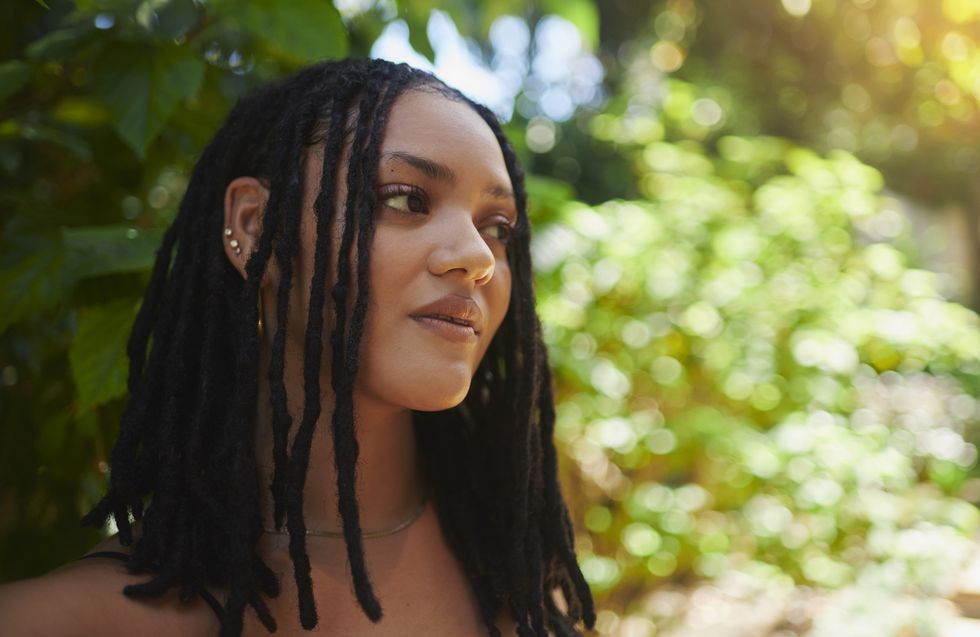
Getty Images
Batana Oil Benefits: Enhances Dark Hair Color Hues
Although batana oil cannot “dye” your hair (because it doesn’t contain deep pigments or chemicals), if you’re looking for an all-natural way to enhance the appearance of your dark hair, it may be able to do that too. Thanks to the dark tint that batana oil has (which is one way to test the integrity of the oil, by the way), it’s been known to bring about the best in darker hues — which will make the color look even richer thanks to the sheen that it also provides.
Batana Oil Benefits: It's an Excellent “Product Enhancement”
I’m someone who applies the oil to my scalp, straight out of the jar that I purchased it in. However, if you’re someone who wants to “ease into” the batana oil or you simply would like it to complement some of your other skin or hair products, it also works well in that way. Some people use it as an addition to their overnight skin moisturizer, pre-poo treatment on wash days, and/or as an additional ingredient in their leave-in conditioner or their hair mask recipes.
Also, if you’re on a mission to get some length retention, it absolutely cannot hurt to apply a bit of the oil to your ends before turning in at night (since your ends are the oldest parts of your hair).
BONUS: How to Know You’re Getting “Real” Batana Oil
Y’all know how it goes — when something magnificent makes its way onto the scene, there are going to be folks out here who try to scam you with a weak-ass imitation of it. Unfortunately, batana oil is no different. That’s why, I decided to close this out with a video from the YouTube channel Karen of Curl House (who has some pretty solid content, in general). If you watch it all the way to the end, you will get the intel that you know in order to feel confident about purchasing the kind of batana oil that will give you the best results of all. (Oh, and for the record, a Black-owned company that brands itself as selling 100 percent vegan batana oil is located here.)
___
There is a lot of stuff to choose from in these beauty-enhancing streets, no doubt about that. However, I can vouch that batana oil will not disappoint. Give it a shot (unless you have a nut allergy; it's made from nuts, after all). Your skin and hair will thank you abundantly, chile.
Let’s make things inbox official! Sign up for the xoNecole newsletter for love, wellness, career, and exclusive content delivered straight to your inbox.
Featured image by Peter Griffith/Getty Images
Because We Are Still IT, Girl: It Girl 100 Returns
Last year, when our xoNecole team dropped our inaugural It Girl 100 honoree list, the world felt, ahem, a bit brighter.
It was March 2024, and we still had a Black woman as the Vice President of the United States. DEI rollbacks weren’t being tossed around like confetti. And more than 300,000 Black women were still gainfully employed in the workforce.
Though that was just nineteen months ago, things were different. Perhaps the world then felt more receptive to our light as Black women.
At the time, we launched It Girl 100 to spotlight the huge motion we were making as dope, GenZennial Black women leaving our mark on culture. The girls were on the rise, flourishing, drinking their water, minding their business, leading companies, and learning to do it all softly, in rest. We wanted to celebrate that momentum—because we love that for us.
So, we handpicked one hundred It Girls who embody that palpable It Factor moving through us as young Black women, the kind of motion lighting up the world both IRL and across the internet.
It Girl 100 became xoNecole’s most successful program, with the hashtag organically reaching more than forty million impressions on Instagram in just twenty-four hours. Yes, it caught on like wildfire because we celebrated some of the most brilliant and influential GenZennial women of color setting trends and shaping culture. But more than that, it resonated because the women we celebrated felt seen.
Many were already known in their industries for keeping this generation fly and lit, but rarely received recognition or flowers. It Girl 100 became a safe space to be uplifted, and for us as Black women to bask in what felt like an era of our brilliance, beauty, and boundless influence on full display.
And then, almost overnight, it was as if the rug was pulled from under us as Black women, as the It Girls of the world.
Our much-needed, much-deserved season of ease and soft living quickly metamorphosed into a time of self-preservation and survival. Our motion and economic progression seemed strategically slowed, our light under siege.
The air feels heavier now. The headlines colder. Our Black girl magic is being picked apart and politicized for simply existing.
With that climate shift, as we prepare to launch our second annual It Girl 100 honoree list, our team has had to dig deep on the purpose and intention behind this year’s list. Knowing the spirit of It Girl 100 is about motion, sauce, strides, and progression, how do we celebrate amid uncertainty and collective grief when the juice feels like it is being squeezed out of us?
As we wrestled with that question, we were reminded that this tension isn’t new. Black women have always had to find joy in the midst of struggle, to create light even in the darkest corners. We have carried the weight of scrutiny for generations, expected to be strong, to serve, to smile through the sting. But this moment feels different. It feels deeply personal.
We are living at the intersection of liberation and backlash. We are learning to take off our capes, to say no when we are tired, to embrace softness without apology.
And somehow, the world has found new ways to punish us for it.

In lifestyle, women like Kayla Nicole and Ayesha Curry have been ridiculed for daring to choose themselves. Tracee Ellis Ross was labeled bitter for speaking her truth about love. Meghan Markle, still, cannot breathe without critique.
In politics, Kamala Harris, Letitia James, and Jasmine Crockett are dragged through the mud for standing tall in rooms not built for them.
In sports, Angel Reese, Coco Gauff, and Taylor Townsend have been reminded that even excellence will not shield you from racism or judgment.

In business, visionaries like Diarrha N’Diaye-Mbaye and Melissa Butler are fighting to keep their dreams alive in an economy that too often forgets us first.
Even our icons, Beyoncé, Serena, and SZA, have faced criticism simply for evolving beyond the boxes society tried to keep them in.
From everyday women to cultural phenoms, the pattern is the same. Our light is being tested.

And yet, somehow, through it all, we are still showing up as that girl, and that deserves to be celebrated.
Because while the world debates our worth, we keep raising our value. And that proof is all around us.
This year alone, Naomi Osaka returned from motherhood and mental health challenges to reach the semifinals of the US Open. A’ja Wilson claimed another MVP, reminding us that beauty and dominance can coexist. Brandy and Monica are snatching our edges on tour. Kahlana Barfield Brown sold out her new line in the face of a retailer that had been canceled. And Melissa Butler’s company, The Lip Bar, is projecting a forty percent surge in sales.

We are no longer defining strength by how much pain we can endure. We are defining it by the unbreakable light we continue to radiate.
We are the women walking our daily steps and also continuing to run solid businesses. We are growing in love, taking solo trips, laughing until it hurts, raising babies and ideas, drinking our green juice, and praying our peace back into existence.
We are rediscovering the joy of rest and realizing that softness is not weakness, it is strategy.
And through it all, we continue to lift one another. Emma Grede is creating seats at the table. Valeisha Butterfield has started a fund for jobless Black women. Arian Simone is leading in media with fearless conviction. We are pouring into each other in ways the world rarely sees but always feels.

So yes, we are in the midst of societal warfare. Yes, we are being tested. Yes, we are facing economic strain, political targeting, and public scrutiny. But even war cannot dim a light that is divinely ours.
And we are still shining.
And we are still softening.
And we are still creating.
And we are still It.

That is the quiet magic of Black womanhood, our ability to hold both truth and triumph in the same breath, to say yes, and to life’s contradictions.
It is no coincidence that this year, as SheaMoisture embraces the message “Yes, And,” they stand beside us as partners in celebrating this class of It Girls. Because that phrase, those two simple words, capture the very essence of this moment.
Yes, we are tired. And we are still rising.
Yes, we are questioned. And we are the answer.
Yes, we are bruised. And we are still beautiful.

This year’s It Girl 100 is more than a list. It is a love letter to every Black woman who dares to live out loud in a world that would rather she whisper. This year’s class is living proof of “Yes, And,” women who are finding ways to thrive and to heal, to build and to rest, to lead and to love, all at once.
It is proof that our joy is not naive, our success not accidental. It is the reminder that our light has never needed permission.
So without further ado, we celebrate the It Girl 100 Class of 2025–2026.
We celebrate the millions of us who keep doing it with grace, grit, and glory.
Because despite it all, we still shine.
Because we are still her.
Because we are still IT, girl.
Meet all 100 women shaping culture in the It Girl 100 Class of 2025. View the complete list of honorees here.
Featured image by xoStaff
I seriously doubt that it will come as a shock to anyone reading this that the “official” cold (and flu) seasons are considered to be during the fall and wintertime. However, what kinda tripped me out is that there really are only a few months of the year when we aren’t susceptible to catching a cold: May-July. SMDH.
Know what else is wild about colds? They have five stages: incubation (1-2 days); symptom onset (1-2 days); peak symptoms (1-2 days); plateau (2-3 days), and recovery (3-5 days) — and that is why, sometimes, it can seem like it takes FOREVER to get over a cold. Also, SMDH.
Luckily, there are some things that you can do to either speed up the healing process of a cold or make having one more bearable than usual. Things that are affordable, all-natural, and easy to incorporate into your daily routine.
Are you ready to know how to nip a damn cold in the bud…before you even get one?
Here ya go.
1. Fire Cider
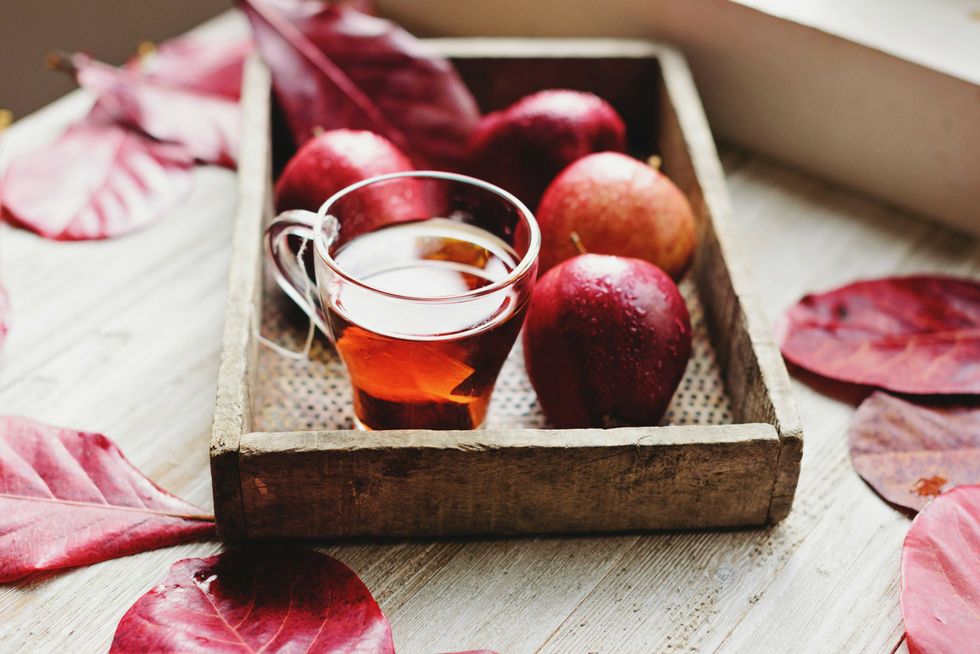
Unsplash
Two drinks that I am gonna drink all the way down, each and every fall season, are hot chocolate and apple cider (that’s warmed up). So, when I read about something called “fire cider,” it absolutely caught my attention. If you’re not familiar with it, fire cider is a homemade drink that consists of things like apple cider vinegar, herbs and other ingredients that are specifically designed to boost your immune system.
I won’t lie to you — since some of the traditional recipes contain things like onion and garlic (sulfur has potent medicinal properties) and sometimes even hot peppers (which help to clear up congestion) — although fire cider might not be your favorite as far as your palate is concerned, the viruses (because there are reportedly somewhere around 200 of ‘em) that cause colds will lose a lot of their impact if you drink this; and that makes it worth a shot — well, swallow. Some fire cider recipes can be found here, here and here.
2. Probiotics
A few years ago, I wrote an article for the platform entitled, “80% Of Your Immunity Is In Your Gut. Take Care Of It Like This.” — and that alone should explain why and how a probiotic can help to prevent colds and make it easier to get over them. The reality is that a healthy gut is what helps to monitor how your immune system reacts and responds to harmful pathogens that may try and get into your system, including ones that cause the common cold.
And since probiotics feed your gut with “good bacteria,” this gives your gut the ability to be better (and quicker) at fighting off the bad. So yeah, take a probiotic — all of the time and definitely while you have a cold. It helps.
3. Peppermint (or Eucalyptus) Oil
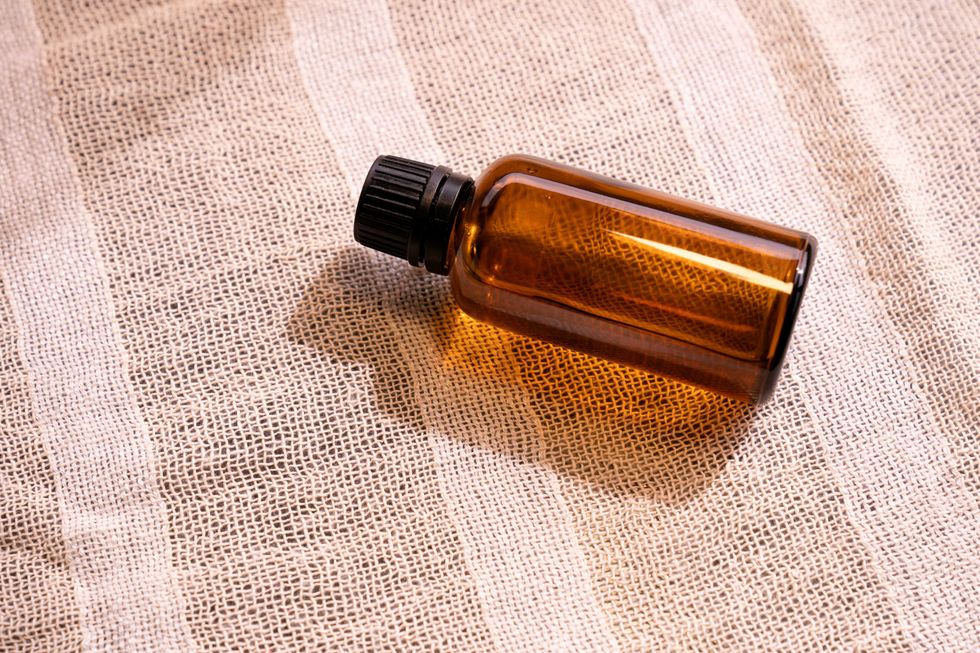
Unsplash
Although I rarely get sick (praise the Lord!), when I do catch a cold, I think what I hate the most is not being able to comfortably breathe. Well, something that is proven to help with that is peppermint essential oil. That’s because it contains properties that act as a natural decongestant as well as a fever reducer. Another essential oil that can hook you up in this department is eucalyptus oil. It’s bomb because it helps to soothe a nagging cough, it can clear up chest congestion and ultimately makes it easier to breathe.
So, before turning in at night, either mix a few drops of one (or both) of these oils with a carrier oil like grapeseed, avocado or jojoba, warm it up for 10 seconds in the microwave and apply it to the sides of your nose or on your best or back. Or put the oil in a diffuser. It can quickly ease cold-related symptoms while also making it so much easier for you to rest (which is something else your body needs to get over a cold; more on that in a sec).
4. Zinc Lozenges
Zinc is a mineral that helps to keep your immune system healthy and strong — and since a weakened immunity is directly connected to having more colds (2-4 a year is considered to be “normal,” by the way), it’s always a good idea to have some zinc in your body. As it relates to colds, specifically, aside from the fact that zinc can help you from catching one to begin with, there are also studies which say that sucking on zinc lozenges can help to shorten the timespan of a cold as well.
To be fair, some people have said that zinc lozenges make them feel nauseated; however, everything has its pros and cons and so, how would you know if you’re one of these folks unless you try it? Oh, and while we are on this topic, there are also zinc supplements and foods that are high in zinc (like red meat, lentils, hemp seeds, cashews and quinoa) if you want to try and get more zinc into your system that way (although lozenges are gonna be your best bet on the shortening tip; just sayin’).
5. Foods Rich in Vitamin C
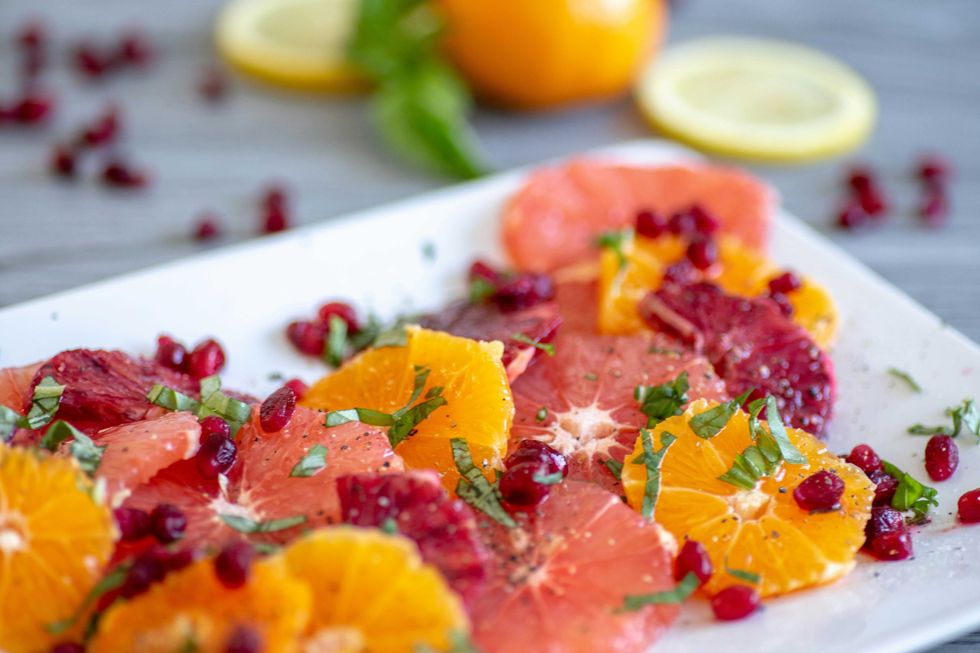
Unsplash
Speaking of foods that can fight a cold, out of all of what you’ve read here, probably what you are quite familiar with is the fact that vitamin C and colds are mortal enemies. In fact, one pretty significant study says that by taking one gram of vitamin C a day during a cold, you can reduce the severity of your symptoms by as much as 15 percent.
That’s because vitamin C is packed with antioxidants, it helps to reduce bodily inflammation and it helps to strengthen your immunity too. Foods that are full of vitamin C include chili and yellow peppers, kale, kiwi, papaya, broccoli, kale and citrus fruits.
6. Elderberry Tea
If you’re someone who likes to put preserves on your biscuits or toast, have you ever tried one that is made from elderberries (recipe here)? It’s actually pretty good — and good for you because elderberries are high in vitamin C, fiber and antioxidants. And that is why they are great whenever you are trying to hurry up and get over a cold because they also contain properties that are literally antiviral — and since a cold is a virus…well, there you have it.
One of the best ways to get elderberries into your system? Elderberry tea. If you add honey to it, honey can help to shorten symptoms like a stuffy nose, sore throat and cough by 1-2 days. Very cool.
7. REST
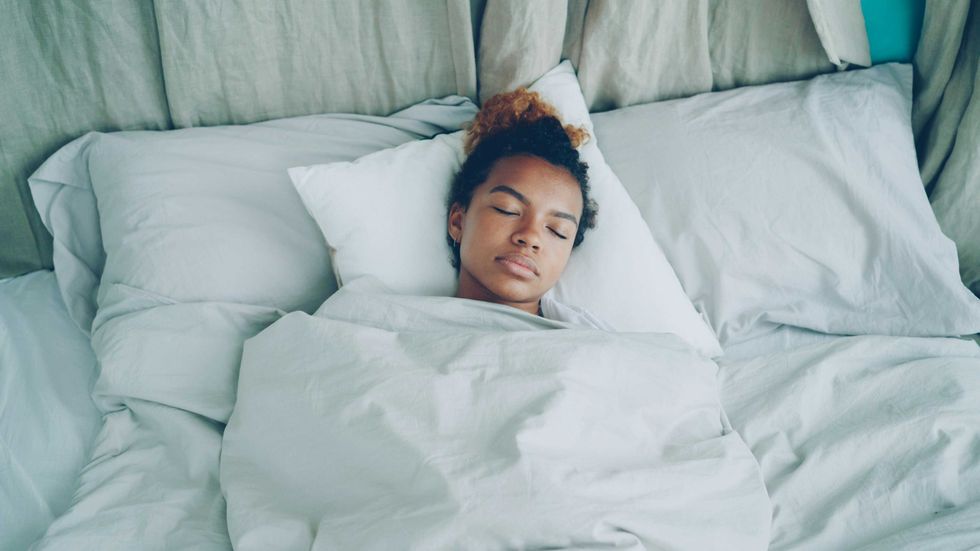
Unsplash
Did you know that even one day of not getting the sleep that you need to weaken your immune system and increase bodily inflammation at the same time too? That’s because one of the benefits of a good night’s rest is it rejuvenates and recharges your system, so that your immunity can work at its optimal level.
Not only that but, according to science, if you already have a cold, getting plenty of rest can benefit you on a few different levels as well. First, your cytokines (proteins that boost your immunity) are released when you sleep.
Second, your body temperature elevates enough to kill some of the bacteria and viruses that are making you sick. Finally, sleep provides you with the energy that you need in order to get through the day while you are healing from your sickness. So, if you want to get through your cold ASAP, be intentional about getting as much rest as you possibly can.
BONUS: A Humidifier
When you get a chance, please check out “10 Really Good Reasons To Get Yourself A Humidifier This Fall”. There really are all kinds of solid reasons to invest in a humidifier around this time of the year — and one of them is to make getting through the cold (and flu) season so much easier for you. Since humidifiers bring moisture into the air, that can help to loosen up congestion, soothe an irritated throat, decrease coughing, help with the healing process of respiratory infections and it can help you to sleep better — so that you can get past your cold sooner.
So, if you don’t already have a humidifier, cop one ASAP. Your future colds will absolutely hate that you did. LOL. For a list of some highly recommended humidifiers that are currently on the market, click here.
Let’s make things inbox official! Sign up for the xoNecole newsletter for love, wellness, career, and exclusive content delivered straight to your inbox.
Featured image by Casper1774 Studio/Shutterstock

